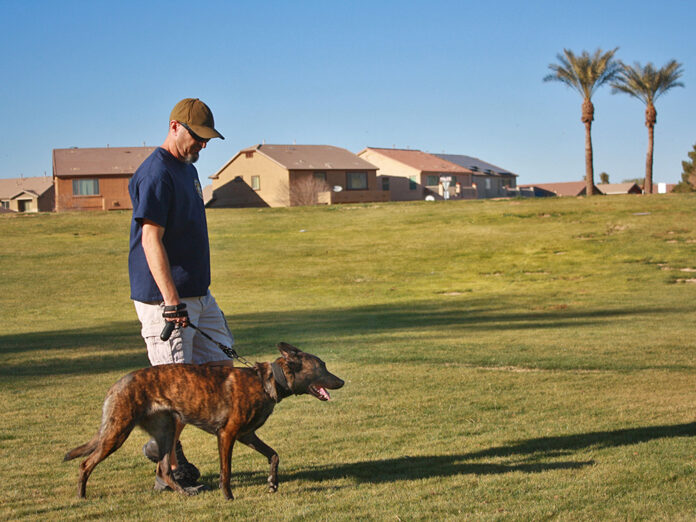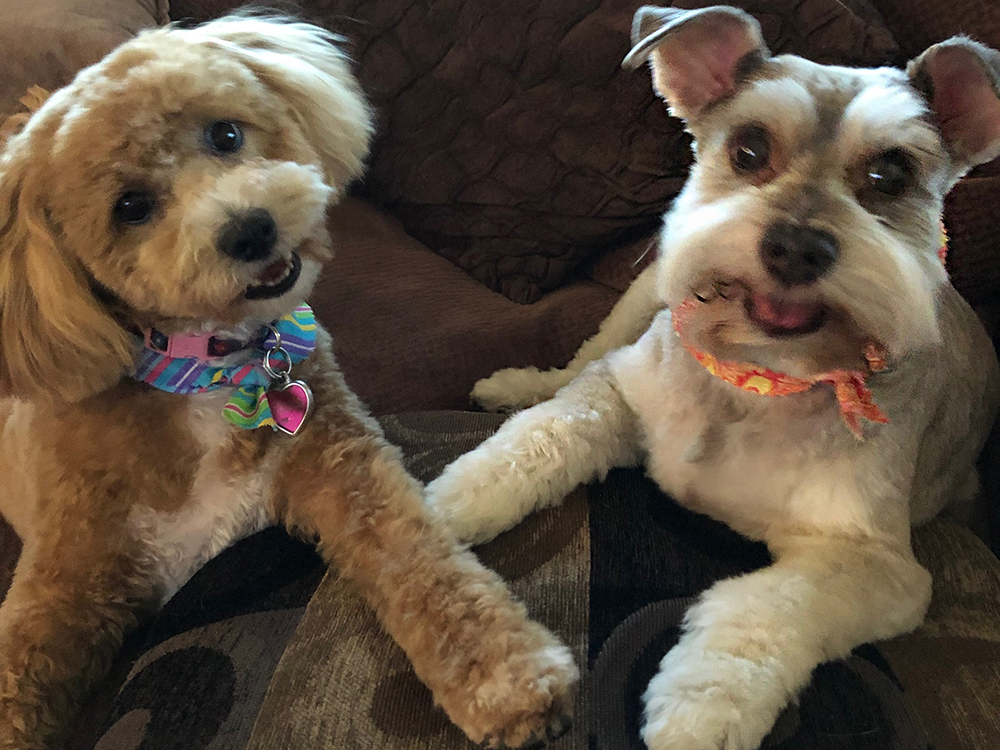
Two neighborhood pit bulls that attacked a Tortosa woman and her two dogs in early December – killing one – had previously terrorized another resident and his pet.
“I heard her make a woof sound,” Jeff Clark said of his Dutch shepherd, Sigrun, in recounting the Dec. 2, 2019 attack. “Turned and saw two adult pit bulls running full speed at us. That image is burned in my memory forever.”
POLL: Is there an aggressive or dangerous dog in your neighborhood?
Clark was walking his dog on a leash and was almost home when the pit bulls set upon them.
“We were walking by and suddenly, boom, they were on us,” he recalled. “I didn’t have much time to react. My main priority was my dog, she was only a year-and-a-half old, which I still consider a puppy, and she didn’t realize we were being attacked.”
“It was terrifying,” Clark continued. “I lifted my dog up to put her on my shoulder, but one of the pits got my pinky finger, then released, then got my elbow. The other dog was biting my dog’s rump. The only thing that saved my arm was my long-sleeved shirt – the dog kept grabbing the shirt instead of my arm.”
The pit bulls, owned by Kesean McBath, are the same dogs that attacked Carol Cook and her dogs, Kali, a miniature schnauzer, and Lacey, a Maltipoo, as they walked in early December 2020 not far from the McBath home.
One of McBath’s dogs sunk its teeth into Cook’s forearm. Kali suffered extensive injuries, including a punctured lung, a broken jaw and punctures to her stomach. The veterinarian who treated Kali told Cook and her husband, Kevin, their nearly 10-year-old pet faced a lifetime of pain – if she survived. The couple made the heart-wrenching decision to put her down.
Clark was luckier. While he dismisses the scar on his elbow, he is more concerned about his beloved Sigrun, who has had post-traumatic stress disorder since the incident. Before the attack, the Dutch shepherd loved being around other dogs, but not anymore, he said, though he continues to work with her on it.
Clark said he later found out that McBath had apparently left his front door open allowing the dogs to rush into the street.
InMaricopa reached out to McBath for comment about the Clark incident, but he did not respond.
Police and fire medics responded to the scene to treat bites to Clark’s left pinky and left elbow. Sigrun had injuries to her back leg which required veterinary treatment.
OWNER APOLOGIZED, PAID BILLS
McBath took responsibility for the attack on Clark and his dog, according to a police report.
“The owner of the two pit bulls (Kesean McBath) stated he went inside of his house to get his car keys when his two dogs ran outside his open front door,” the police report said. “(McBath) apologized and stated he would pay for the veterinarian bill.”
The officer said the incident would be reported to an animal control officer.
McBath came to his home to make payment for both his medical bills and Sigrun’s veterinarian bills, Clark said.
“I’ve seen kids in the neighborhood out walking their dogs. What would happen if the dogs attacked one of those kids?” – Jeff Clark
Pinal County Animal Control put McBath’s pit bulls on home quarantine since it was a first offense, and it wasn’t a severe injury-related attack, said director Audra Michael.
The animals also were put on quarantine after the Cook attack.
An investigation of that incident by Maricopa Police Department is continuing, according to spokesman Luis Vila.
“The criminal part of this is still going on at MPD and will be based on their determination of whether charges could be filed,” he said. “The investigation still ongoing and I haven’t been told when they may make a determination.”
But Vila said he was told by police Lt. Sean Marchese that the Clark incident would not aggravate any charges against McBath in the Cook case.
Clark was incredulous that the dogs were still in the neighborhood a year after attacking him and his dog.
“I can’t believe those dogs are allowed to stay here,” he said. “How is this possible? My wife wants to move out of the neighborhood, move to a 55-and-over community down near Casa Grande because she just can’t be out in the neighborhood knowing those dogs are there.”

‘ANIMAL LAWS IN ARIZONA HAVE NO TEETH’
Pit bulls have many devoted fans but plenty of other people, including Clark, see them as dangerous dogs, though not always that way. National statistics show there is reason to be wary: when a dog attacks and kills a human, by far the most likely culprit is a pit bull.
In 2019, the most recent year for which statistics are available, there were 48 dog bite-related fatalities in the United States, according to DogsBite.org, a public education website about dangerous dogs. Despite being regulated in military housing areas and more than 900 U.S. cities, pit bulls were responsible for 33, or 69%, of the deaths even though the breed only makes up about 8% of the total U.S. dog population, the web site said.
This was not a one-year anomaly. During the 15-year period from 2005 to 2019, dogs killed 521 Americans and two breeds were responsible in 76% of the deaths – pit bulls with 346 deaths and Rottweilers with 51 deaths. The remaining fatal dog attacks were spread among many different breeds.
Also, in 2019, 81 percent of all dog bite-related fatalities were attributed to pit bulls (33 deaths), Rottweilers (4), American bulldogs (1), and Mastiff-type guard dogs and war dogs (1) – the types used to create “baiting” bull breeds and fighting breeds.
According to Arizona’s “strict liability” law, the owner of a dog that bites a human is immediately liable to the victim, even if there were no previous circumstances.
But state law defines an “aggressive dog” as one that has bitten a person or domestic animal, or has a known history of attacking people or pets without provocation.
According to Arizona Revised Statutes, “A person who owns a dog that the owner knows or has reason to know has a history of biting or a propensity to cause injury or to otherwise endanger the safety of human beings without provocation or that has been found to be a vicious animal by a court of competent jurisdiction and that bites, inflicts physical injury on or attacks a human being while at large is guilty of a class 5 felony.”
The law also states that the owner or individual responsible for an aggressive dog must take reasonable care to prohibit the dog from escaping the owner’s property or enclosed area. Failure to do so results in a Class 1 misdemeanor, even if the dog does not bite anybody while at-large.

But Michael, the director of Pinal County animal control, said the laws do little to help her department police aggressive or dangerous dogs.
“Animal laws in Arizona have no teeth, which is something we have dealt with for years,” she said. “It is not our job to decide what dogs should be euthanized or deemed vicious. It is for a judge to decide, and unless there is credible evidence presented as such, usually it will not get as far as a judge’s verdict of vicious.”
‘WHAT’S IT GOING TO TAKE?’
Mayor Christian Price agreed the city is somewhat hamstrung when it comes to enacting laws against aggressive dogs.
“I spoke with (Jeff Clark),” Price said. “It certainly is something we’re concerned about. I think there is certainly the ability and the desire that we would love to do more but we’re also regulated by the state here. So, the state dictates what happens with these animals.”
Once state law has been satisfied, and the dog has gone through its mandated 10-day rabies quarantine, it is up to the victim to take the owner of the dogs to civil court to get justice, Price said. That changes, though, if the city conducts an investigation and determines that criminal charges are warranted against the owner.
“It’s our job as a city to do an investigation and determine if there is a need for criminal charges,” he said. “If that’s the case, it takes a different path. But without criminal liability it becomes a civil case that the victim has to deal with.”
Asked what he thinks should be done with McBath’s pit bulls, Clark said he feared future attacks.
“I mean, (the Cook attack) is the second time these dogs have attacked and bitten a human,” he said. “What’s it going to take for something to be done about this? I don’t feel safe walking my dog in my own neighborhood. I feel like I have to have my head on a swivel any time I’m outside in the neighborhood.
Clark said it was obvious to him that McBath cannot control his animals.
“I don’t want to bash or slander him, but it’s been two times already – enough is enough. I’ve seen kids in the neighborhood out walking their dogs. What would happen if the dogs attacked one of those kids? What’s it going to take?”







![MHS G.O.A.T. a ‘rookie sleeper’ in NFL draft Arizona Wildcats wide receiver Jacob Cowing speaks to the press after a practice Aug. 11, 2023. [Bryan Mordt]](https://www.inmaricopa.com/wp-content/uploads/2024/04/cowing-overlay-3-218x150.png)




![Alleged car thief released without charges Phoenix police stop a stolen vehicle on April 20, 2024. [Facebook]](https://www.inmaricopa.com/wp-content/uploads/2024/04/IMG_5040-218x150.jpg)




